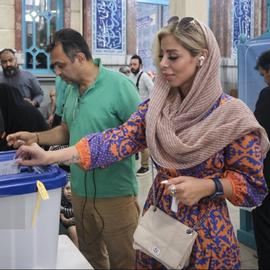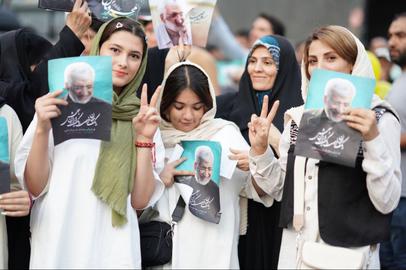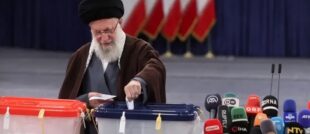Iranwire – Contrary to the organizers’ previous promises, women not adhering to the standard dress code of the Islamic Republic were barred from voting in the presidential election.
This contradicts the statement made by the Guardian Council’s spokesperson three months ago during the parliamentary election.
“The right to vote has not been revoked in any law, and it cannot be revoked even by the court,” referring to women who would appear without the mandatory hijab.
Reports surfaced on social media about women being prevented from entering polling stations without hijab during the first round of the 14th presidential election.
Fariba, a 32-year-old woman, was among those barred from entering the polling station.
“I went to a school to vote. Although I don’t usually wear a hijab after the Mahsa protests, I wore a shawl and a coat that day to ensure I could vote,” she told IranWire.
However, she was denied entry due to her “thin” coat.
Fariba added: “As people noticed the conversation between me and the agent, some soldiers and other plainclothes forces arrived and violently pushed me away from the school.”
This brief conflict caused others who wanted to vote to leave the polling station in anger.
Fariba wasn’t the only one barred from voting on Friday due to her attire.

Eyewitness reports indicated that women “without mandatory hijab” and even those considered “bad hijab” in the government’s official terminology were not allowed to enter polling stations in Tehran.
Another woman in Ahvaz confirmed in an interview with IranWire that she was also prevented from voting due to her hijab.
Yalda, a 45-year-old woman, was not allowed to enter a polling station in Ahvaz because her trousers were deemed too short.
According to Yalda, her attire was no different from what she wore daily to enter government offices.
“The official at the station disdainfully told me that the Islamic Republic of Iran does not need votes from women like me. He used insulting words and pushed me out of the polling area,” she recounted.
The issue of compulsory hijab extends beyond women.
On the morning of Friday, Babak Majidi, a reporter for ILNA news agency, shared a picture on X of a man in shorts being barred from entering a polling station, writing: “He was prevented from entering Hosseinieh Ershad due to his attire and was thrown out.”
Similarly, a woman in Karaj was denied the opportunity to vote because her ten-year-old daughter was not wearing a hijab.
She recounted to IranWire: “Despite my full hijab, they wouldn’t let me vote because my daughter did not have hijab.”
A security officer at the polling station told her that his orders were to prevent entry to all women without hijabs, regardless of age.
Despite these incidents, official media of the Islamic Republic published images of women with so-called “bad hijab” in front of voting stations.
Additionally, during the election campaigns, candidates from the revolutionary movement shared pictures of women without hijab.
The Islamic Republic has previously used images of women without hijab in official ceremonies, such as Qassem Soleimani’s funeral and the anniversary of the 1979 Islamic Revolution.
The suppression of citizens, particularly women, on the day of the presidential election, disregards the preferences of women during the election campaigns.
Among the candidates, Masoud Pezeshkian, who advanced to the runoff stage, criticized the “Noor Plan” but did not oppose the mandatory hijab.
He said, “Interference in the name of the Noor Plan is dragging us into darkness.”

Another candidate, Saeed Jalili, defended the hijab, calling it a relative advantage of society and insisted on enforcing the law without hesitation.
He argued that women’s social dress is essential for their safe and calm social presence.
The presidency’s powers regarding hijab are limited by laws.
Many of the Islamic Republic’s supporters await the approval of the “Chastity and Hijab Law,” parts of which are enforced even without formal approval.
According to the national survey, a majority of the nation supports separating religion from politics and opposes measures against women who appear without a headscarf.
 Shabtabnews In this dark night, I have lost my way – Arise from a corner, oh you the star of guidance.
Shabtabnews In this dark night, I have lost my way – Arise from a corner, oh you the star of guidance.



